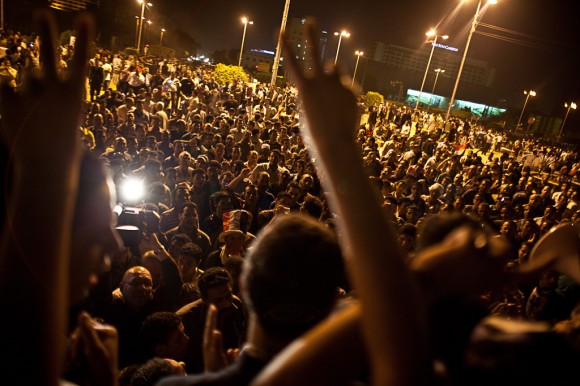This article first appeared on CNN.
See also: 40 questions about the coming revolution.
We’re halfway done with 2011, a year marked by remarkable, revolutionary uprisings in the Middle East – uprisings facilitated and documented on Twitter, Facebook, and other social media.
When the governments in Egypt and Syria tried to control the flow of information from citizens by blocking Internet access and other forms of communication, the worldwide perception of these acts was that they were sinister and cruel. People were silenced. It was as if their vocal chords were cut; it was as if we, outside the Middle East, were blinded.
Was the impact so dramatic because today Internet access has reached the status of a basic need – like clean water or electricity?
The United Nations, in fact, recently declared that disconnecting people from the Internet is a violation of human rights. And if connectivity is a human right, how do we help make the Internet more accessible to everyone – from those in the throes of a revolution, to fellow citizens back home? What is our responsibility to bridge the digital divide?The World Bank’s international infrastructure statistics provide a snapshot of how the human need for Internet connectivity keeps growing exponentially. In the early 1990s, according to the Bank, there were 0.3 Internet users for every 100 people. Today, that figure is 27.1 per 100.
If you are living your life online it is easy to be caught up in the assumptions of your own, gilded online lifestyle – a broad spectrum of information and news on demand; entertainment at the touch of your fingertips, more of everything faster than before.
In the United States, 92 percent of Americans rely on multiple sources for news, combining traditional print, TV, and radio and online sources, according to the Pew Internet & American Life Project, and among those who get news online, 75 percent receive their news via email or posts on social networking sites. 52 percent share news links with others via those sites. Statistics such as these suggest that those people who do not have access to the Internet are missing out; not only are we deprived of their voices, but also of their ability to learn about and interact with their communities and the world.
I bring up American statistics because even in the U.S., the concept of Internet connectivity as a basic human right, or even a form of public infrastructure, is not really an everyday practice.
Remember the first half of the 2000s, when numerous sophisticated cities, such as San Francisco and Chicago, trumpeted plans for free municipal Wi-Fi? Well, government officials later discovered that high costs and the commercial interests of giant cable and phone companies, who control where and how wires connecting citizens to the Internet are placed, were huge hurdles in making such visions real. Even San Francisco, that hotbed of innovation, scrapped its plans for “free” municipal Wi-Fi.
Though many Americans can access free Wi-Fi in libraries, parks, and other public places, the service is limited. Waiting for a computer connected to the Internet in a public library can mean waiting in long, discouraging queues to do so.
Free outdoor Wi-Fi in U.S. parks is often in a very limited radius, or of spotty quality. It’s hard to imagine that some Americans simply can not afford to access the Internet. But in theUnited States, it can be more expensive than in other parts of the so-called developed world: broadband-access fees are currently higher in the U.S. than in Europe or the Asia-Pacific region, according to the International Telecommunications Union.
In many ways, the water parallel can apply. Cheap, clean tap water, provided via public infrastructure, is obviously a healthy and humane service that all Americans expect. But imagine if high-priced, privatized water was only available to those who could afford it in the United States. If we are to accept that affordable Internet access is a basic human right, then we need to be willing to confront such challenging thoughts. And do something about it.
When cutting off Egyptian and Syrian protesters’ Internet access is perceived as “censorship,” then pricing Internet access out of American consumers’ reach as more and more basic communication happens online each day is effectively an act of censorship, too. Our attitudes about the Arab spring hold up a mirror to ourselves.
